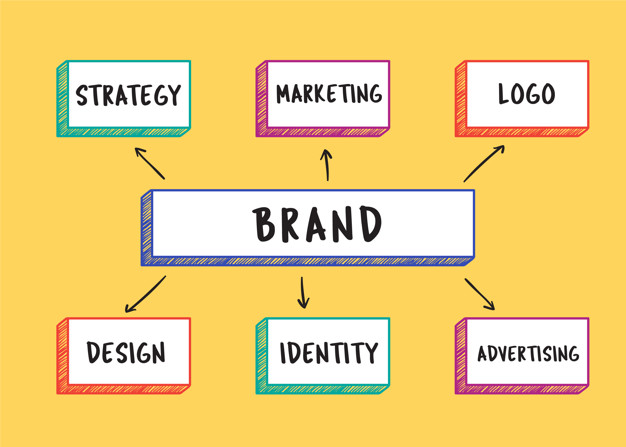Definition of Brand
A brand is a symbol, mark, logo, name, slogan, idea, or any other feature used by a company to be recognized by people and set it apart from its competitors. Different elements can be combined to create a brand or personality of a company.
A brand is a name and recognition that a product, service, business, or person has in the market. It is an identity. Brand strategy is used for differentiating a product from similar other products, for instance, Coca-Cola enjoys a different brand identity than Pepsis.
Having a good brand name empowers a business to stand out from the clutter and pull in attention. It even empowers businesses to charge more compared to other market players like the brand Apple. Brands that have a clear identity and greater faith in their function survive longer than any other similar product/service/brand which undifferentiated.
A brand name is associated with loyalty, faith, trust, premium-ness, and mass-market appeal. All such characteristics of a brand are based upon how the brand is marketed, promoted, and advertised.
What are Brands?
A brand is like a living being that comprises a name, identity, culture, personality, vision, emotions, and intelligence. All such features are conferred by the brand owner who should constantly monitor these features to let the brand relevant to the target audience.
The idea of a brand often encompasses an intangible connection with customers as well. It refers to their customers’ perceptions and feelings when engaging with their products, ads, etc. The recognizable features of a brand can lead to a company being synonymous with its brand in customers’ eyes. Hence, brands become essential assets in a company’s business operations that bring about brand awareness, competitive advantage, and sales.
For example, the brand Dove evokes more than just images of soap. It is associated with the white bird symbol, feelings of purity, moisture, softness, simplicity, etc.
Elements of the term Brand

A brand can be broken down into its various elements to can contribute to a robust and accurate brand that represents a company’s values for years to come. These five elements are as follows:
1. Brand personality
Branding is a great way to humanize a product, service, or company as a whole. This refers to cultivating characteristics, behavior, or quirks that line up with the target audience’s characteristics and needs. This allows them to relate to the brand and results in customer loyalty in the long run.
2. Brand compass and archetype
A brand compass is necessary to guide a company on the correct route in a sea of choices. This refers to the brand’s primary goals, which include the purpose, vision, mission, values, and strategic objectives of the brand. On the other hand, a brand archetype refers to the values and ideas that a brand needs to uphold and communicate with its target audience.
3. Brand positioning and experience
Brand positioning means defining the unique position that a brand will occupy in the preferences of customers. This could direct a brand to be a modern, vegan luxury brand or an affordable, gender-neutral, eco-friendly makeup brand. These positions need to stand the test of time so that sales remain stable no matter how quickly trends change. The brand experience involves the experience of buying and the experience of a brand’s website, in-store ambiance, product experience, etc. These need to be memorable and consistent to inspire customer loyalty.
4. Brand identity
This involves the appeal of the brand. Visual identity would encompass elements such as the logo, color scheme, font, photography, etc. Although it is hard to measure their effects, these elements need to reflect the brand position and values somehow. There is also a verbal identity of a brand, which includes things like the tagline, slogan, copywriting, tone, etc.
5. Brand’s competitive advantage
One goal of branding is to set it apart from customers, which in turn guides the customer to easily recognize the brand and favor it for all future purchase decisions. This could be done through lower pricing, unique formulation, etc.
Brand Development of a Product or Service

It is true that branding is an investment over many years rather than a one-time indulgence. With that being said, branding is an expense that pays back exponentially if done right. Here are three reasons why building a brand is essential:
1. Plan effective marketing strategies
If costly marketing efforts are falling flat, it might be because of ineffective branding. With a solid foundation of branding, marketing strategies can be streamlined with a better message, visual appeal, and brand position that engages with the right audience in the right way.
2. Increase prices and sales
Customers don’t just buy products anymore; they buy brands. Hence, branding boosts sales not only for one marketed product but all other items of the company as well. Brands can also demand higher prices and increase profit margins without losing out on customers.
3. Serve customers better
Branding helps change the perspective from stakeholders to customers. A company trying to create a brand has to think like their customer, define their demographics, psychographics, what attracts their attention, etc. This helps attract the right audiences to the brand as well as a tailor all its products to their needs.
Wrap Up!
Now, on the concluding note, it is clear that a brand is actually a business, individual, organization, concept, product, or service that can publicly be distinguished from other alternatives in the market.
What factors do you consider crucial for effective brand development? What would be your definition of the brand now after going through this post?
Pinky is an MBA in Marketing from the University of Mumbai. She loves helping people out in learning Marketing and sharing latest ideas and tactics for growing businesses.
